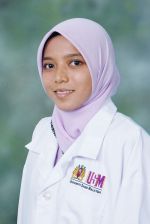WELCOME TO MOLECULAR DIAGNOSTICS
-
Introduction
Molecular Diagnostics Unit* offers diagnostic investigations in molecular diagnostics by applying molecular biology to medical testing. Technique that is widely used in molecular diagnostics is Polymerase Chain Reaction (PCR). Some tests carried out by Molecular Diagnostic Unit are additional / further tests to support other units in CDL.
*Note: The tests in Molecular Diagnostics are not MS ISO 15189 accredited.
-
List of Available Tests
PROFILE TEST Polymerase Chain Reaction (PCR)
- Southeast Asian Ovalocytosis (SAO)
- Sex-determining Region Y (SRY) gene*
DNA Extraction
- Blood samples
- Tissue samples: chorionic villus sampling, fresh tissue sample
Multiplex PCR for Molecular Alpha Thalassemia
-
Note:
*Normally samples are sent from Genetics Unit for ambiguous genitalia or other sex related syndrome / abnormality. -
Sample Collection
- All samples sent to the Molecular Diagnostics Unit should be requested by contacting 04-562 2293. Samples can be sent from Monday to Thursday accompanied by a complete and correctly filled Molecular Diagnostic Request Form and Proof of Payment.
- A correct amount of blood volume as stated on the tube is collected into the appropriate anticoagulant for the test requested. To ensure the volume of blood collected is correct, fill the tube to the indicator line.
- The blood should be mixed gently and thoroughly for 8-10 times by a rotary wrist movement to prevent clotting.
- Every samples should be accompanied by details of clinical history and diagnosis in the electronic request and a completely filled request form.
- The request should be accompanied with an Informed Consent for DNA test (except for DNA extraction request).
PCR SRY gene:
- Blood is collected in EDTA tube. However, if the sample is send together with chromosomal study to Genetics Unit, the blood should be collected in lithium heparin tube*. The blood should be mixed well to prevent clotting.
*Note: Please refer to Chapter 4 for more details. - The blood should be transported in ice (make sure not to freeze the blood) and accompanied by a complete and correctly filled Molecular Diagnostic Request Form.
PCR SAO:
- Blood is collected in EDTA tube. The blood should be mixed well to prevent clotting.
- For prenatal screening, chorionic villus sampling (CVS) can be sent to Molecular Diagnostic Unit together with parents’ blood sample.
- The blood should be transported in ice (make sure not to freeze the blood) and accompanied by a complete and correctly filled Molecular Diagnostics Request Form.
- The request must be accompanied with a copy of recent FBP (< 3 months) result.
- All paediatrics (≤ 12 years old) samples must be accompanied with parents’ samples.
Blood DNA Extraction:
- Blood is collected in EDTA tube. The blood should be mixed well to prevent clotting.
- The blood should be transported in ice (make sure not to freeze the blood) and accompanied by a complete and correctly filled Molecular Diagnostics Request Form.
Multiplex PCR Molecular Alpha Thalassaemia:
- Blood is collected in EDTA tube. The blood should be mixed well to prevent clotting.
- The blood should be transported in ice (make sure not to freeze the blood) and accompanied by a complete and correctly Molecular Diagnostics Request Form.
- The request must be accompanied with a copy of recent FBP (< 3 months) result and Hb Analysis result.
- All paediatrics (≤ 12 years old) samples must be accompanied with parents’ samples.
-
Sample Transportations
All samples should be sent to the Molecular Diagnostic Unit within 48 hours of collection. After delivering the sample/s please inform the laboratory staff by contacting 04-562 2293 to make sure that the lab is aware there is/are sample/s. If there is an unavoidable delay between the collection of the sample and dispatch, the sample can be stored in a refrigerator at 2 - 8°C. It is the responsibility of the requesting staff to ensure that samples arrive at the laboratory in suitable condition. Samples should be transported in ice without freezing.
-
Acceptance Criteria for Verbal Requests
- Request should be made on same day sample is sent to the lab.
- Request should be made by the requesting / treating doctor.
-
Reporting Results
TEST TURN AROUND TIME TEST: PCR SRYTURN AROUND TIME:Within 10 working days from the date sample is received
TEST: PCR SAOTURN AROUND TIME:Within 10 working days from the date sample is received
TEST: DNA extractionTURN AROUND TIME:Within 5 working days from the date sample is received
TEST: Multiplex PCR for Molecular Alpha ThalassemiaTURN AROUND TIME:Within 10 working days from the date sample is received
All reports will be emailed to the requesting hospital / clinic / ward based on the email address provided.




